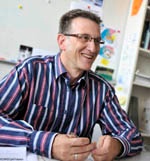Neuropsychological studies have detailed several cognitive deficits in Prader-Willi Syndrome (PWS), among which the observation of altered social interactions, with notable difficulty in interpreting and responding to social information. The integration of the information from the face and the voice is important for our social communication as they are essential for our understanding of the social world and to interact with it. Indeed, faces and voices provide observers rich and complex information about the identity (gender, age, etc), the socio-emotional state (eye-gaze and prosody) and the linguistic message (auditory speech sounds/mouth movements) of our social partners. Our hypothesis is that PWS patients present deficit in processing these important social informations. In complement to our recent observation showing that PWS are unable to discriminate a human voice from environmental sounds, we are proposing to study how PWS are processing human faces. The aim of this research project is to understand, first, how infants with Prader-Willi Syndrome perceive communicative faces from their first months of life. We hypothesize that the general lack of alertness observed at birth might prevent infants with PWS to benefit from communicative faces as much as normal-developing babies. Later on in their life, these early impairments could contribute to their immature social and emotional behaviors. Indeed we will evaluate infants and young adult PWS patients using natural images and videos with a specific analysis of the oculomotor behavior using eye-tracking device. This project will allow us to characterize these abilities and then, more importantly, to develop adapted rehabilitation methods, intervening since the first month of life, to stem the development of further social and cognitive impairments later on. Crucially, this study could not only improve care but could also directly impact the social life of people with Prader-Willi Syndrome.
Funded Year:
2017
Awarded to:
Pascal Barone, PhD
Amount:
$79,630 (Funded in partnership with FPWR-France)
Institution:
University of Toulouse, France
Researcher:





